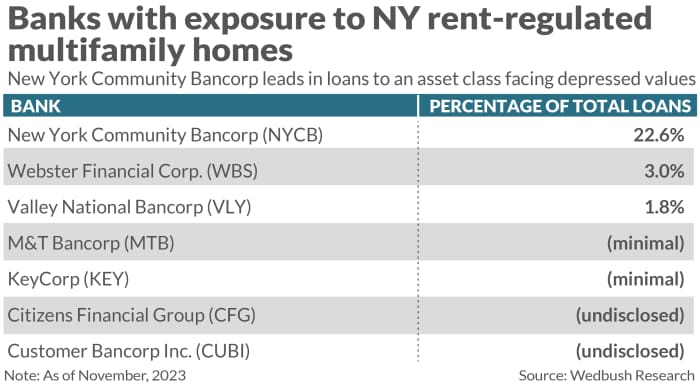New York Community Bancorp Inc.’s exposure to stressed loans for rent-controlled multifamily apartments and office space continue to weigh on the outlook for the bank, leading to its second debt downgrade in about a month from Moody’s Investors Service.
“The possibility of rising provisions for credit losses and higher funding costs will complicate the bank’s ability to organically raise capital,” Moody’s said late Friday.
Moody’s downgraded all long-term and some short-term ratings and assessments of New York Community Bancorp
NYCB,
further into junk territory, after the bank said it had “material weaknesses” in its accounting protocols and said it would delay its financial filings.
Flagstar Bank, NA, the operating business of holding company New York Community Bancorp, was downgraded to Ba3 from Baa2, lowering it from investment-grade to speculative-grade, or junk, status.
Moody’s said the company’s Feb. 29 disclosures “are further signals…that it is undergoing substantial changes in governance, oversight, risk management and internal controls” during a “particularly challenging” operating environment which includes risks in its loan portfolio.
The bank’s challenges may also “negatively affect” confidence among depositors and investors, Moody’s said.
“Moody’s believes that NYCB may have to further increase its provisions for credit losses over the next two years because of credit risk on its office loans, and that there is substantial repricing risk on its multifamily loans,” analysts said.
The bank also faces higher funding costs on its interest-bearing liabilities due to higher-for-longer interest rates expected in 2024.
The bank now faces $3.4 billion of multifamily loans maturing in 2024 and $5.1 billion of loans maturing in 2025, Moody’s said. It has about $18.3 billion in multifamily loans to rent-regulated apartments on its balance sheet.
The risk-weights on seasoned multifamily loans could rise to 150% from 50% if the loans become non-performing, Moody’s said.
A non-performing loan (NPL) is defined as borrowed money whose scheduled payments have not been made by the debtor for a period of time, usually 90 or 180 days.

New York Community Bancorp, the parent of Flagstar bank, faces a higher percentage of total loans to rent-controlled multifamily homes
MarketWatch/Terrence Horan
The U.S. Supreme Court on Feb. 20 declined to hear challenges to New York’s rent stabilization laws, Moody’s said. Those laws have prevented landlords from raising rents to help combat the impact of higher interest rates.
The case stemmed from 2019’s Housing Stability and Tenant Protection Act, which was crafted to create more affordable housing. It also changed rules that had allowed landlords to increase rents on rent-controlled multifamily units.
Since then, property expenses have been growing due to inflation, putting pressure on net operating income and stressing debt-service coverage ratios, Moody’s said.
The bank also faces $313 million of office loans maturing in 2024 and $237 million in 2025, Moody’s said. About 54% of the bank’s office loans are in Manhattan, which currently has a vacancy rate of about 15%, Moody’s said.
The risk-weights on office loans that become non-performing would rise to 150% from 100%.
The rating cut by Moody’s move comes about a month after it downgraded NYCB’s ratings to junk territory, on the heels of the bank’s surprise loss that crushed its stock price.
On the positive side for the bank, on Friday it named a new chief risk officer as well as a chief audit executive.
New York Community Bancorp’s sole traded bond has fallen in recent days on the heels of its latest disclosures, as the following chart from data solutions provider BondCliQ Media Services shows. The floating-rate notes mature in 2028.

NY Community Bancorp bond price fell sharply last week
BondCliQ Media Services
Those bonds were issued in 2018 in the amount of $300 million.
Also read: New York Community Bancorp ‘is on its own’ to work out accounting mess, analyst says

